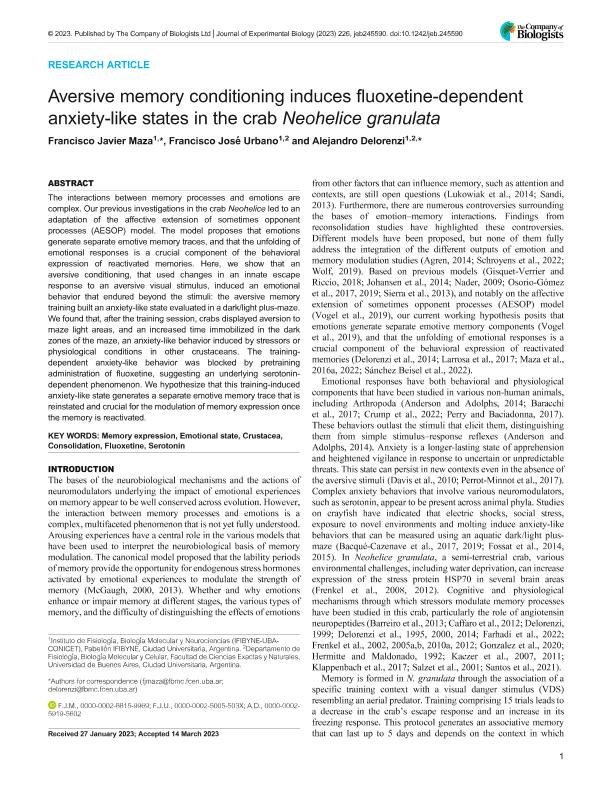Artículo
Aversive memory conditioning induces fluoxetine-dependent anxiety-like states in the crab Neohelice granulata
Fecha de publicación:
03/2023
Editorial:
Company of Biologists
Revista:
Journal of Experimental Biology
ISSN:
0022-0949
Idioma:
Inglés
Tipo de recurso:
Artículo publicado
Clasificación temática:
Resumen
The interactions between memory processes and emotions are complex. Our previous investigations in the crab Neohelice led to an adaptation of the affective extension of sometimes opponent processes (AESOP) model. The model proposes that emotions generate separate emotive memory traces, and that the unfolding of emotional responses is a crucial component of the behavioral expression of reactivated memories. Here, we show that an aversive conditioning, that used changes in an innate escape response to an aversive visual stimulus, induced an emotional behavior that endured beyond the stimuli: the aversive memory training built an anxiety-like state evaluated in a dark/light plus-maze. We found that, after the training session, crabs displayed aversion to maze light areas, and an increased time immobilized in the dark zones of the maze, an anxiety-like behavior induced by stressors or physiological conditions in other crustaceans. The training-dependent anxiety-like behavior was blocked by pretraining administration of fluoxetine, suggesting an underlying serotonin-dependent phenomenon. We hypothesize that this training-induced anxiety-like state generates a separate emotive memory trace that is reinstated and crucial for the modulation of memory expression once the memory is reactivated.
Palabras clave:
CONSOLIDATION
,
CRUSTACEA
,
EMOTIONAL STATE
,
FLUOXETINE
,
MEMORY EXPRESSION
,
SEROTONIN
Archivos asociados
Licencia
Identificadores
Colecciones
Articulos(IFIBYNE)
Articulos de INST.DE FISIOL., BIOL.MOLECULAR Y NEUROCIENCIAS
Articulos de INST.DE FISIOL., BIOL.MOLECULAR Y NEUROCIENCIAS
Citación
Maza, Francisco Javier; Urbano Suarez, Francisco Jose; Delorenzi, Alejandro; Aversive memory conditioning induces fluoxetine-dependent anxiety-like states in the crab Neohelice granulata; Company of Biologists; Journal of Experimental Biology; 226; 8; 3-2023; 1-9
Compartir
Altmétricas




